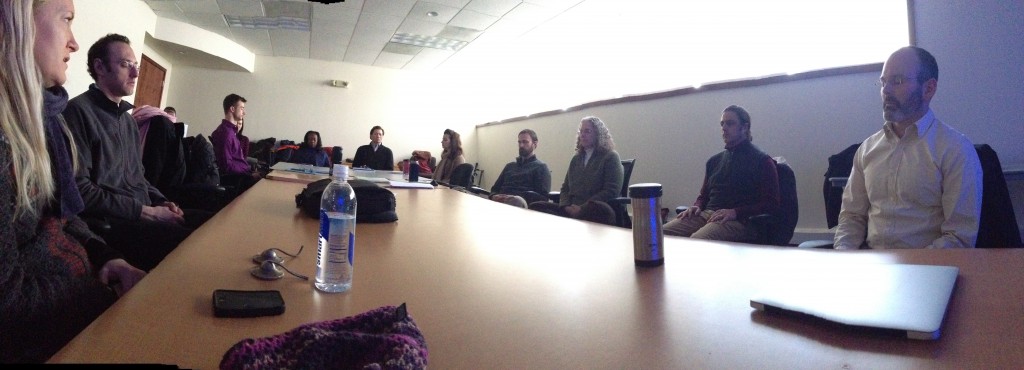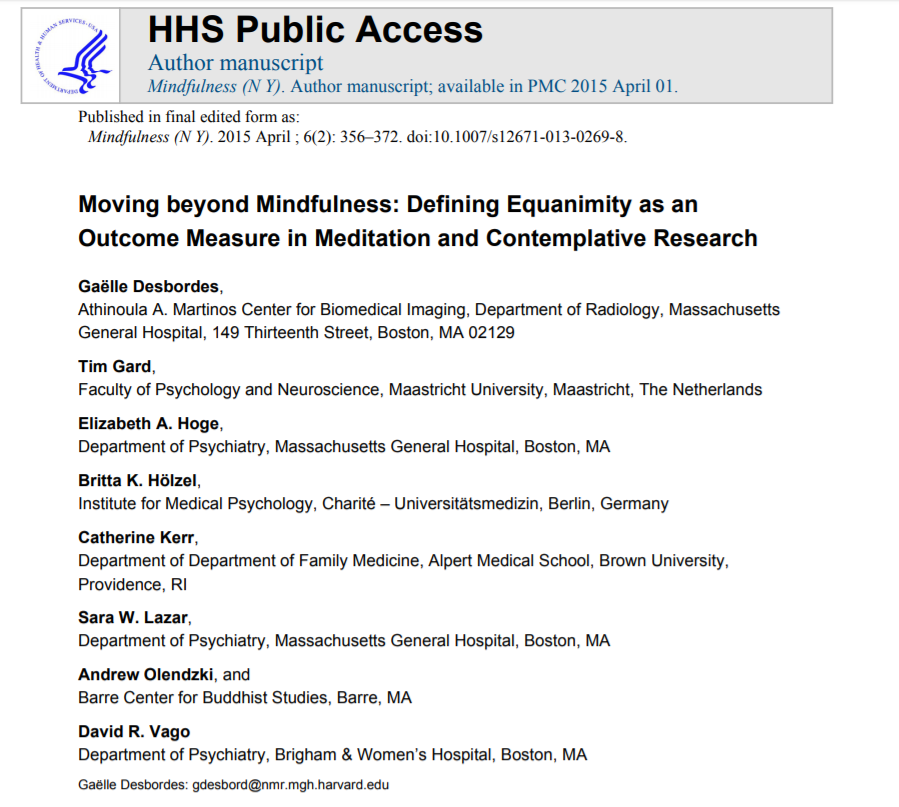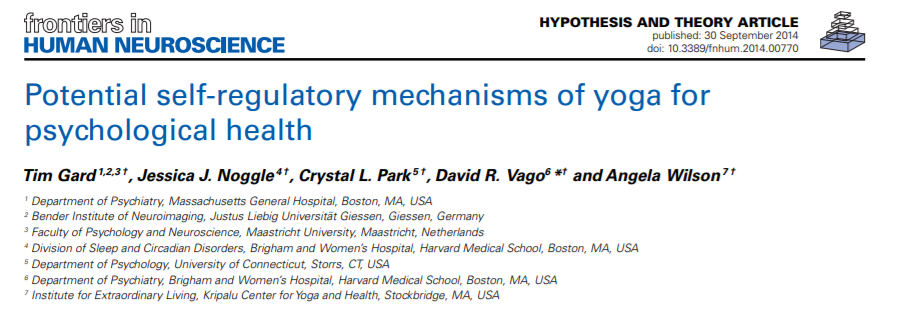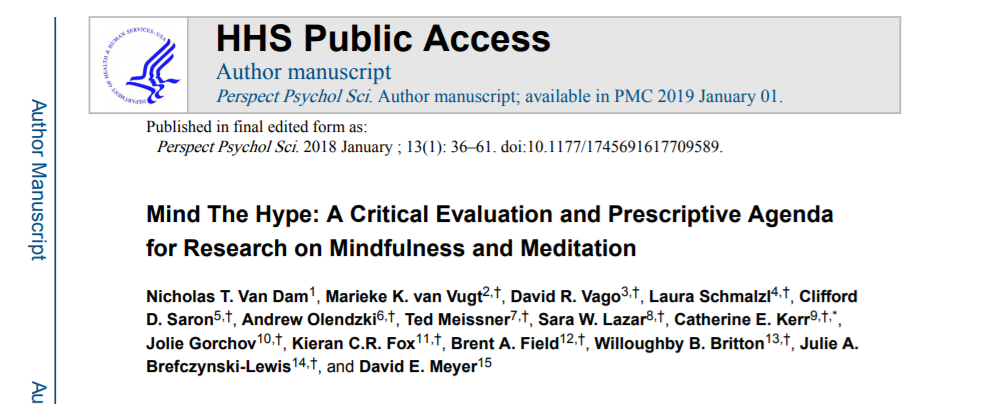The MRC
The MRC is a collaborative network of mindfulness researchers, scholars, and practitioner-teachers who meet regularly to set research agendas, write collaborative position papers, and do collaborative multi-site research.
Core Members
Brewer, Judson, M.D., Ph.D.
I received by BA in chemistry from Princeton University and my MD/PhD from Washington University in St. Louis, where my thesis work focused on molecular mechanisms of stress hormone regulation of the immune system using conditional knockout mouse models. After training in mindfulness meditation during medical and graduate school, I shifted my focus from animal models of stress, to the elucidation of neurobiological mechanisms underlying the interface between stress, mindfulness and the addictive process, and in developing effective means for the modulation of these processes to better treat substance use disorders and deliver mindfulness training.
My laboratory has developed and tested treatments that help individuals with substance use disorders (e.g. smoking) using mindfulness training. For example, we have found that mindfulness is twice as effective as leading treatments for smoking cessation, and that it moderates the decoupling of craving and smoking. We have gone on to develop web/app-based approaches as scalable solutions for smoking cessation, and are now testing their efficacy.
Additionally, my laboratory has studied the neurobiological mechanisms of meditation, finding that areas of the default-mode network (e.g. the posterior cingulate cortex) are specifically deactivated during different types of meditation. We are now using real-time fMRI neurofeedback to link subjective experience with brain activity, and are beginning to test EEG methods for these purposes.
Britton, Willoughby, Ph.D.
Willoughby Britton received a B.A. in Neuroscience from Colgate University, a Ph.D. in Clinical Psychology from the University of Arizona, and completed her clinical internship at Brown Medical School. She received sleep/EEG technician training at Harvard Medical School and was a Research Fellow at the National Institute on Drug Abuse (NIDA/NIH) and at Andrew Weil’s Program in Integrative Medicine at the University of Arizona. She spent several years in Asia studying meditative techniques and received her mindfulness instructor certification training at the Center for Mindfulness at the UMASS Medical School. Dr. Britton’s research includes sleep, emotional disturbances, and new treatment/prevention strategies. She recently completed a 3-year NIH-funded clinical trial on the neurophysiological effects of mindfulness meditation in depression, and continues to examine the link between sleep, affective disturbance and emotional regulation strategies. Two current research projects aim to examine the effects of meditation practices in 6th graders and college students.
Davis, Jake, Ph.D.
I work primarily in metaethics, normative ethics, and empirically grounded moral psychology, as well as in philosophy of mind and cognitive science. My research program aims to advance current debates in these areas by drawing both from recent empirical research and also from my expertise in Buddhist philosophy, in the way that other contemporary systematic philosophers find inspiration in Hume or Kant or Aristotle. My studies in the early Buddhist texts and Buddhist philosophical psychology were complemented by long periods of intensive meditation practice, years of training as a monk in the Theravāda Buddhist tradition of Burma (Myanmar), and a decade of work interpreting between Burmese and English for meditation masters. I hold a doctorate in Philosophy from the Graduate Center of the City University of New York, with an Interdisciplinary Concentration in Cognitive Science, and a master’s in Philosophy from the University of Hawaiʻi at Mānoa.
Desbordes, Gaelle, Ph.D.
Gaëlle Desbordes, Ph.D., is an Instructor at Harvard Medical School conducting research at the Athinoula A. Martinos Center for Biomedical Imaging within the Massachusetts General Hospital. Trained as a neuroscientist and with a background in engineering and computer science, her current research focuses on the neuroscientific investigation of meditative practices and their clinical applications, using brain imaging with functional MRI. She is the recipient of a K01 Career Development Award from the U.S. National Institutes of Health (K01AT008225) and a Francisco J. Varela Research Award from the Mind and Life Institute. She is also an active contributor to the Emory-Tibet Science Initiative, an ongoing effort overseen by the Dalai Lama aimed at implementing a comprehensive and sustainable science curriculum for Tibetan monks and nuns. For more information, please visit http://martinos.org/~gdesbordes/
Fulwiler, Carl, M.D.
Carl E. Fulwiler, M.D., Ph.D. is an Associate Professor of Psychiatry at the University of Massachusetts Medical School and Director of its Center for Mental Health Services Research, a Research Center of Excellence for the Massachusetts Department of Mental Health. He is also Director of the Mental Health Agency Research Network. He is board-certified in Psychiatry and Addiction Medicine and received a Ph.D. in Neuroscience. Combining health services research with neuroimaging, his work has focused on developing and evaluating services for individuals with co-occurring mental health and substance abuse disorders, and on mindfulness-based interventions for wellness. He has received professional training in Mindfulness-Based Stress Reduction (MBSR) and Mindfulness-Based Cognitive Therapy for Depression (MBCT). Dr. Fulwiler is currently conducting an NIH-funded study using neuroimaging to understand the impact of MBSR on neural mechanisms of emotion regulation and health behaviors involved in successful weight loss.
Hoge, Elizabeth, M.D.
Dr. Elizabeth Hoge is a clinical assistant at the Center for Anxiety and Traumatic Stress Related Disorders at Massachusetts General Hospital. She studies biological changes that occur in the body as a result of stress, anxiety and trauma, which may serve as markers for anxiety disorders and may elucidate pathways that could be targeted for novel pharmacologic therapies. She is also interested in identifying biological markers of resilience that protect some people from developing post-traumatic stress disorder after a trauma. Dr. Hoge has received awards from the Anxiety Disorders Association of America and the New Clinical Drug Evaluation Unit of the National Institute of Mental Health related to her work in anxiety disorders. She also received a Harvard Medical School Dupont Warren Fellowship award to study the effect of treatment for Post-Traumatic Stress Disorder on the hypothalamic-pituitary-adrenal axis. Recently, Dr. Hoge received a five-year NIH grant to measure the effect of mindfulness meditation on anxiety and stress. She will be incorporating biological markers of stress, such as stress hormones and inflammatory markers, and will measure how the practice of mindfulness meditation may effect these biomarkers, which may partially explain the beneficial health effects from meditation. Her new position can be found here: http://ctc.georgetown.edu/hoge
Kerr, Cathy, Ph.D. (in memory)
Catherine Kerr received a B.A. from Amherst College, and a Ph.D. from the Johns Hopkins University and was a postdoctoral fellow at Harvard University and an Instructor at Harvard Medical School, where she received a career development award from the NIH to investigate attention, somatosensory cortical dynamics and mindfulness. In 2011, she joined the Department of Family Medicine and the Contemplative Studies Initiative (for which she is Director of Translational Neuroscience) at Brown University. Her work has been published in Journal of Neuroscience, BMJ, Brain Research Bulletin and other journals, and has been covered in the New York Times, Technology Review and Forbes.
King, Jean, M.D.
Dr. King holds a doctorate in neurophysiology from New York University and a master’s degree in cell biology from the City University of New York, both with distinction. She is a graduate (magna cum laude) of St. Francis College in New York. She has published numerous original scientific papers in highly respected international scientific journals, over 10 chapters in books and review articles in major neurophysiology journals, and is an editor of the recently published book Roots of Mental Illness in Children. She has been a scientific consultant for the National Science Foundation and National Institutes of Health as well as the Veterans Administration. Dr. King has served as editorial consultant for the several scientific journals, including Hormones and Behavior, Neuropsychoendocrinology, Neuropsychobiology and Biological Psychiatry.
Lazar, Sara, Ph.D.
Lazar is a neuroscientist and a meditator. She has focused her studies onto the effects of meditation on the brain for over 12 years. She received her PhD in Molecular Biology. Dr. Lazar focuses her research on the neural mechanism of action of meditation. She uses neuroimaging techniques to study cognitive and emotional changes associated with the practice of meditation and yoga. Her lab incorporates measures of peripheral physiology as well in order to understand how meditation practice influences the brain-body interaction. For more information, please see http://www.nmr.mgh.harvard.edu/~lazar/
Lindahl, Jared, Ph.D.
Dr. Lindahl is a Visiting Scholar at the Cogut Center for the Humanities and also a Visiting Assistant Professor of courses for Contemplative Studies and Religious Studies at Brown University. In 2010, he received his Ph.D. in Religious Studies from the University of California, Santa Barbara. His dissertation investigated the ascetic and contemplative practices of Tibetan Buddhist and Greek Orthodox Christian traditions, focusing specifically on those that are oriented towards experiences of light or luminosity, as well as the religious value ascribed to such experiences. To ground the comparisons across traditions, his research also engaged the cognitive science of sensory deprivation and meditation as a means of identifying potential mechanisms associated with light-related contemplative experiences. Since 2010, Dr. Lindahl has been teaching courses in Buddhist studies, contemplative studies, Asian religions, and theory and method in the study of religion at various colleges and universities.In the Britton Lab, Dr. Lindahl is Director of Humanistic Research for the Varieties of Contemplative Experience project. He is lead author on the first paper from the project, entitled “A Phenomenology of Meditation-Induced Light Experiences: Traditional Buddhist and Neurobiological Perspectives,” which is based on his dissertation research and qualitative data from Varieties project interviews.When he is not engaged in scholarly pursuits, Jared enjoys cultivating contemplative equanimity through traditional as well as unconventional means such as music appreciation, tea connoisseurship, abstract painting, and explorations of the natural world.
Loucks, Eric, Ph.D.
Dr. Loucks focuses his research on identifying biological mechanisms by which social factors such as mindfulness, education, and early life adversity may influence cardiovascular disease. He started his training with a BSc in Physiology and a PhD in Pharmacology & Therapeutics, both focused on biological mechanisms of cardiovascular disease. He then went on to a post-doctoral fellowship at the Harvard School of Public Health in the Department of Society, Human Development and Health, where he was trained in social epidemiology. During and since that time he has generated research findings that have helped to better understand how biological factors such as inflammatory markers, epigenetics, blood pressure, obesity, lipids, amongst others, may be important mechanisms through which social factors could influence cardiovascular disease. This has led to over 60 peer-reviewed publications, and wide coverage of research findings in outlets such as TIME Magazine and BBC News. He uses epidemiological methodological techniques such as propensity score matching and mediation analyses to probe into plausible mechanisms that could explain social disparities in health. He is now increasingly moving into practical applications of the work, including randomized controlled trials of mindfulness interventions to reduce social disparities in cardiovascular disease.
Olendzki, Andy, Ph.D.
I have always been interested in learning, and in understanding the big picture.
My studies started in philosophy because it promised to ask the largest questions (though I found the field narrowing as it progressed through the ages). Exposure to Chinese philosophy widened that scope considerably, and the study of Sanskrit and Pali gave me access to the rich Indian traditions where philosophy plays a supporting role in a much larger investigation of meaning. I gravitated, quite naturally it seems, to the teachings of the historical Buddha because of their remarkably clarity, profundity, accessibility, and universality.
I started meditating very early in this exploration, as practice seemed to be such an obvious and necessary tool for engaging with Buddhist studies. The Buddha’s teaching is all about examining and understanding the field of lived experience, and it became central to my approach that the study of Buddhist texts and the practice of insight meditation be thoroughly integrated–as I think they were always meant to be.
After beginning a conventional academic career, I left college teaching to become the first executive director of the Insight Meditation Society, and helped to found and develop the Barre Center for Buddhist Studies. These are institutions that are trying to live these experiential teachings in a contemporary context, and I am proud of the contributions I have made there to the larger project of rolling the wheel of Dhamma a bit further down the road. Over two and a half decades in Barre, I saw the once fringe phenomenon of meditation become mainstream, the once obscure teachings of the Buddha become popular, and helped to connect the classical teachings of the Buddha to many modern movements, including health (via MBSR), psychology (via the Institute of Meditation and Psychotherapy), and the scientific understanding of consciousness (via the Mind & Life Institute).
Currently I am pursuing these interests as an independent scholar, teacher, and writer, and hope to make many creative contributions to the field over the coming years.
Schuman-Olivier, Zev, M.D.
Dr. Zev Schuman-Olivier is Adjunct Assistant Professor of Psychiatry at Geisel School of Medicine at Dartmouth and Clinical Instructor of Psychiatry at Harvard Medical School. As a board-certified addiction psychiatrist, he has been involved with research and clinical care of patients with addiction and mental illness. He has conducted several research projects focusing on treatment of addictive disorders. Prior to his psychiatric residency, he helped coordinate and implement the first federally-funded, randomized controlled trial of a mindfulness-oriented intervention for addictive disorders. He was principal investigator on a NIDA grant to develop an ecological momentary assessment tool for investigating the effects mindfulness training on smoking cessation. He also received a Harvard Medical School Dupont-Warren research fellowship to investigate the effects of meditation on inhibitory control. He has published numerous studies on the treatment of opioid dependence, addressing the challenges facing implementation of outpatient buprenorphine maintenance therapy. He was given the American Academy of Addiction Psychiatry Young Investigator Award for his buprenorphine research. He is the former medical director of the WestBridge OnCourse college support program, where he established clinical expertise in the treatment of substance use disorders and co-occurring disorders among emerging adults (18-25 year olds). The goal of his current funded pilot research is to demonstrate feasibility of a novel mobile platform for buprenorphine treatment designed to prevent diversion and enable remote monitoring of medication adherence among emerging adults with opioid dependence.
Vago, David, Ph.D.
David is the research director for the Osher Center for Integrative Medicine at Vanderbilt University and research associate at the Functional Neuroimaging Laboratory, Brigham & Women’s Hospital, Harvard Medical School. He is associate professor in the department of Physical Medicine & Rehabilitation as well as Psychiatry and Behavioral Sciences. David completed a post-doctoral fellowship in the department of Psychiatry at BWH, the Stuart T. Hauser Research Training Program in Biological and Social Psychiatry, and at the Utah Center for Mind-Body Interactions within the University of Utah Medical School. David has held the position of Senior Research Coordinator for the Mind & Life Institute, a non-for-profit organization dedicated to fostering dialogue and research at the highest possible level between modern science and the great living contemplative traditions. He currently is a Mind and Life Fellow, a selected group of distinguished scientists, scholars, and contemplative practitioners who support the Mind and Life mission and strategy by advising on strategy and programs. He received his Bachelors Degree in Brain and Cognitive Sciences in 1997 from the University of Rochester. In 2005, David received his Ph.D. in Cognitive and Neural Sciences with a specialization in learning and memory from the department of Psychology, University of Utah. David’s research interests broadly focus on utilizing translational models to identify and characterize neurobiological substrates mediating psychopathology and healthy mind-brain-body function. In this context, David has been specifically focusing on investigating functional-anatomical brain mechanisms supporting mindfulness-based meditation training. Through his research, David hopes to clarify adaptive mind-brain-body interactions and their therapeutic relevance in psychiatric disorders and health settings. He has been practicing meditation since 1996 (Goenka-Vipassana and Dzogchen traditions), and is an active yoga practitioner.






